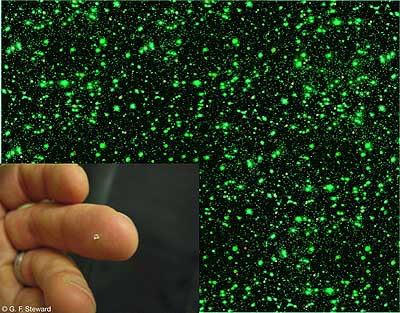JGI will sequence three uncultivated viruses (obtained by physical fractionation) from one of the largest biomes on the planet: the oligotrophic (low-nutrient) open ocean. Viruses are an integral part of the marine ecosystem. Every living thing in the ocean appears to be susceptible to disease and death caused by viral infections. Although viruses cannot replicate on their own, they outnumber all forms of cellular life in the oceans by roughly an order of magnitude. Marine viruses are not only numerous, but also extraordinarily diverse, both morphologically and genetically.

The tiny cube on the finger (inset) measures 1 mm on each side, a volume of one microliter. Background demonstrates the very large number of microorganisms in one microliter of seawater. The microbes have been captured on a filter, stained with a green fluorescent DNA stain, and visualized in an epifluorescence microscope. The larger green dots (numbering about 1000) are bacteria, and the much smaller dots (about 10,000) are viruses. (Courtesy Grieg Steward.)
Viruses have a particularly significant influence on the cycling of carbon and nutrients in marine planktonic communities. They cause the termination of phytoplankton blooms and lyse a significant fraction of the daily marine bacterial production. Food web models predict that viruses increase respiration and production by bacteria at the expense of larger organisms. Because of the intimate interaction and exchange that occurs among viruses and their hosts, an understanding of any marine organism is incomplete without knowledge of the viruses with which it interacts. The viruses in a sense represent the “extended genotype” of cellular organisms.
The mining of the greatest source of genetic novelty on our planet, the viruses, may well result in the discovery of new genes relevant to all three of DOE’s missions. One potential outcome is identification of viral sequences useful as vectors for bioengineering of marine bacteria or archaea. Besides the genetic information, the data will lead to a better understanding of a class of organisms that directly affect plankton in the ocean in a number of different ways, including causing mass mortality, mediating genetic exchange, and effecting lysogenic conversion (survival of viruses in an infected bacterium without destroying it). These processes have direct relevance to efforts to exploit marine prokaryotic and eukaryotic plankton for carbon sequestration, alternative energy, or bioremediation.
Principal Investigator: Grieg F. Steward (Univ. of Hawaii)
Program: CSP 2009